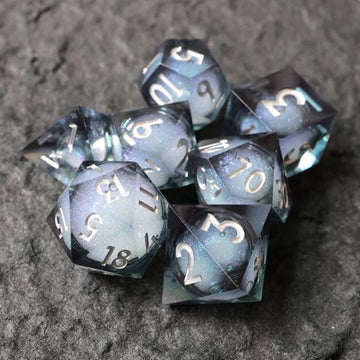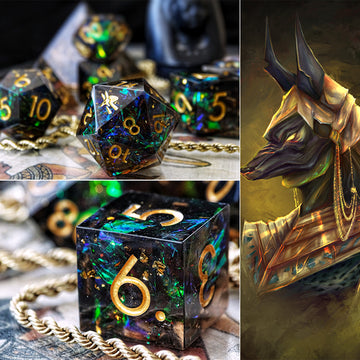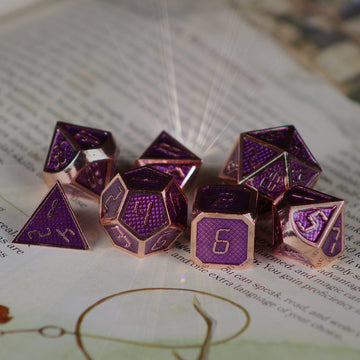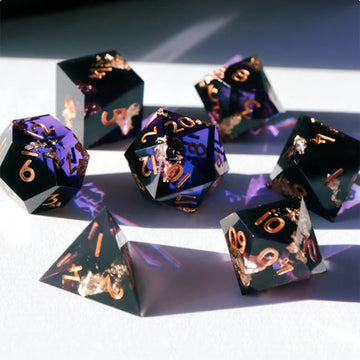Title Image © SlothBeing
Insight 5e: How to Use It and Not Abuse It!
There is a 77% chance y'all are doing Insight dnd 5e checks wrong in your RPGs.
Granted, that is a made up stat. But if we're being honest, the reality is probably closer to 88%!
Because every time someone watches Critical Role, they are compelled to join their first D&D campaign (thank you CR!)
And that means another table gets a new player that yells "Insight check!" expecting to dismantle the suspicious NPC they've encountered (dammit CR...)
That is not how TTRPGs work, skills work, or Insight works... it's not how ANY OF THIS WORKS.
And yes... it matters... because when we do Insight wrong, role playing our social encounters becomes a lot less fun.
Read on (or just click to whichever section floats your boat) to discover why.
Table of Contents
What Is an Insight Check 5e?
An Insight check is an ability skill check in DnD where a PC (playable character) attempts to discern the true state, character, or intentions of a creature. A successful Insight check should reveal something that was previously hidden or unclear to the players.
What Is an "Insight 5e Check" NOT?
An Insight check is not a magical lie detector test. Dozens of TTRPG players and Dungeon Masters have stated this across message boards, podcasts, and YouTube channels... and now it is my turn.
I repeat: a successful Insight check does NOT automatically tell you that the NPC in question is lying!
It's not meant to be a substitute for role-playing. Relying too much on Insight can hold back the natural flow of storytelling and turn social encounters into a robotic task. It should help characters to pick up on social hints and changes in others through role-playing.
How Players Mess Up an Insight Check DnD 5e
In the introduction I indicated the two ways players make Insight (5e) an overpowered and overused skill check:
- They assume it automatically tells them what is true and what isn't.
- They declare when they want to use it.
It's #2 that I want to focus on right now... because every experienced DM could explain to you how problematic that is. In fact, it's a fundamental misunderstanding of how any TTRPG is played.
I don't want to wade too deep into the woods here, but The Angry GM perfectly explains what I mean with his "D-D-D" method (source):
- Players 1) DECLARE what they want their character to accomplish.
- Game Master's 2) DETERMINE what is the best way to see if the player is successful or not.
- (whoever needs to roll rolls if necessary)
- The Game Master 3) DESCRIBES the result of the player's action.
Let me provide an example:
- A player declares "I want to swing on the chandelier."
- The GM determines "okay, that will take an Acrobatics check" and sets a DC.
- The player rolls a d20 and adds modifiers.
- Depending on the roll's total vs the DC, the GM describes what happens to the character.
Makes perfect sense, right?
But as soon as we apply what players do with Insight checks 5e to other checks, we immediately see how silly our Insight checks are:
- A player declares "I want to make an Acrobatics check."
- The DM and everyone at the table pauses and looks at them: "Uh... why?"
- The player explains "cuz I want to swing on the chandelier."
- Then the GM MAYBE replies "Oh... well, that will take an Acrobatics check."
Basically, you just confused everyone at the table and wasted time.
But even worse, you might be presuming! What if the DM said "Actually, the chandelier is kinda high... what is your jump distance?" Or what if they say: "Actually, it's no roll." Or they let the player, but then say "the chandelier rips from the ceiling, make a CON save."
In summary, players do not call for Insight checks, or any checks. They stay immersed in the moment their character finds themselves in and tells the DM what they want to do or accomplish. Then the DM helps them resolve it; players are always to wait for the DM's prompt before rolling.
How DMs Mess Up DnD 5e Insight Checks
Well... the DM is SUPPOSED to help them resolve it... but they can mess up Insight checks too! Almost always they do so by reinforcing the player assumption that Insight 5e check = lie detector test.
Side note: keep in mind as a DM that whatever you reward, you positively reinforce and therefore should expect players to repeat!
1) They reveal too much on a successful or unsuccessful check
Just because a player rolls high on his Insight check does not mean he learns EVERYTHING about the NPC, what that NPC wants, and what that NPC ate for breakfast that morning. Unless one of your players rolled an Inquisitive Rogue and is literally Sherlock Holmes, that is ceding waaay too much power to the Insight skill.
And yes, they can reveal too much on a FAILED roll as well. If your player rolls a 1 and you tell them "Yeah, you believe this NPC is as trustworthy as your beloved mother"... well... EVERY SINGLE PLAYER at the table now knows that is FALSE. And even though their characters are oblivious to that truth, they will bend over backwards to try and find a way for their characters to discover the truth.
2) They give the players conclusions rather than information.
A video by the Alexandrian pointed this out quite succinctly. The point of an Insight check is to provide CLUES... indications that what is being presented to them might not be all there... that there is more than meets the eye.
As I explained in my "Why DISCOVERY makes the exploration pillar AWESOME" post, this creates either anxiety or curiosity in the players, and compels them to explore more so that hey can make a discovery. And making a discovery is ALWAYS fun and satisfying.
But... if the DM tells a player "yeah, this guy is a lying thief," guess what?
You just robbed them of their discovery!
Some of the best moments in stories, whether a book, movie, or D&D game, are those "A-ha!" moments. These are the times when the truth comes out or when a character shows their true self. And by changing the question from "is this character lying?" to "What signs is this character showing?" the game stays fun!
Bottom line: DMs need to stop players from abusing Insight 5e checks.
Talk to your players about how many times they can use the Insight skill during social situations and set their expectations for what kind of information they might learn. Let players know that Insight (5e) shows hints about a creature's true intentions, but it won't reveal every detail easily. This wil help create more engaging social exploration and prevent Insight from being the main answer to every social problem.

© Licheng Mai
5e Content Creator "Insight 5e Check" Suggestions
The Dungeon Coach and "Secret Insight Checks"
The Dungeon Coach has a GREAT idea for "secret insight checks." Instead of having the players roll, the DM rolls for any player making an Insight check BEHIND THE SCREEN on their behalf. Then, based on the results of their rolls, a provides different clues.
However, since the players don't know who rolled high and who rolled low, they continue in a state of relative uncertainty. This forces them to remain engaged and continue to role play, as they attempt to figure out whether their hunches are accurate or not (watch it here).
Diana of the Rose and "Physical Tells"
Similar to the Alexandrian, Diana of the Rose has an excellent short video that encourages DMs to use the "Lie to Me" method. This turns the Insight 5e check into a "sense motive" tool by relying on verbal, physical, facial, and emotional cues. When players make a successfu Insight check, a DM would give some kind of clue as to the NPC's intentions:
- Maybe their hand is shaking...
- Or their lips are pursed...
- Or their voice is shaky...
- Or they are stuttering their speech
This approach encourages players to pay close attention to both your descriptions and your role-playing. However, in my option, it doesn't fully solve the problem because A) it requires amazing role play from the DM, B) it requires players with awareness of human psychology, C) not all races in dnd are human, and D) as I will explain in the next section, I do not believe this is what insight truly is! That said, I believe many players and DMs find this approach helpful and will include a list of physical cues and tells at the ends of the blog post.
Nerdarchy and Passive Insight
Nerdarchy argues that half the time DMs should be rolling Deception vs the players' passive Insight. The reason why is simple: when players try to roll Insight there is actually a great risk they will roll lower than their passive score. Furthermore, more often than not it is the NPC that is attempting something (Deception) and so the onus is on them to roll. The downside: if the DM does not have all the player characters' passive Insight on hand, then players will know that someone is trying to deceive them as soon as a DM asks for their passive Insight score.

Alternative: Clarifying What Insight IS (Unconscious Knowledge)
This section might feel dumb if you are a long time player. You might say to yourself, "Of course I know what Insight 5e checks are... I've been playing Dungeons and Dragons for years over a dozen campaigns!"
True... and there is a case to be made that the way everyone runs it in their campaigns is the best way to run it. But when we actually look into what Insight means, there is opportunity for an entirely different way to run Insight 5e checks in our games...
According to Merriam-Webster, insight is:
- The power or act of seeing into a situation.
- The act or result of apprehending the inner nature of things or of seeing intuitively (source).
At first glance, one can see how Insight is confused with Perception. After all, both involve seeing reality... right?
Well... yes and no.
Notice how the first definition explicitly states that insight is "seeing INTO a situation," not just seeing it. Because insight isn't just noticing something... it's an accurate apprehension and sympathetic cognition of reality.
So what do they mean by "apprehension" and "seeing into"?
Insight is understanding via INSTINCT and INTUITION.
Which begs the question... what do THOSE words mean?
- Intuition: "The ability to acquire knowledge, without recourse to conscious reasoning or needing an explanation" (source).
- Instinct: "The inherent inclination of a living organism toward a particular complex behaviour, containing innate (inborn) elements" (source).
Insight's connection to intuition and instinct is why it is often synonymous in DnD with your player character having a gut feeling: "A gut feeling, or gut reaction, is a visceral emotional reaction to something[...] Gut feelings are generally regarded as not modulated by conscious thought, but sometimes as a feature of intuition rather than rationality" (source).
Translation: the result of DnD Insight checks should not be conscious or rational.
I propose that while insight has a variety of meanings in the real world, in DnD, when made distinct from Perception, it is an unconscious or irrational understanding of the way things are.
Such an understanding of insight as intuition and instinct can be found in Hinduism, Henri Bergson, and Carl Jung. In fact, the idea is that intuition is the UNION of conscious (rational intellect) and the unconscious (wisdom instincts), resulting in a new avenue for knowledge, focusing less on the "how" things are (how they appear) and more on the "what" things are (the essence of things).
NOTE: I will personally buy a dice set to anyone that can post the source of that above paragraph (spoiler: not Kant).
This is why Insight is traditionally a Wisdom skill, not an Intelligence skill. And while Perception is when you perceive reality consciously; intuition is when you perceive reality unconsciously. In other words, "Seeing the inner nature of things"... just like the dictionary definition says!
These types of Insight 5e checks tell successful players their REACTIONS... not providing CLUES.
If the player makes a successful Insight skill check, the DM should NOT tell them its because they noticed the NPC looked away or that they started to talk faster. Rather, the DM should make their knowledge much more enigmatic and mysterious... like the abyss of our unconscious.
Here is an example:
- The players are being given an assignment from an NPC.
- The NPC is a leader of a local thieves guild that loves killing people.
- The assignment is to steal a golden crown.
- The NPC plans on killing the party after they deliver the golden crown.
- During the interactions, the NPC is lively and optimistic, but also sinister and intimidating.
- One of the players is getting bad vibes and wants to know why.
- The DM calls for an Insight check
- The player's Insight check is successful
Then, instead of telling them the physical tells, or telling them "yeah, he'll betray you," the DM tells the player something like:
- "Ever since the start of the conversation, you have had a feeling if DREAD slowly building up inside you."
- You can't shake the feeling that this person ENJOYS the crimes they commit."
- "You know deep down that this NPC does not ACTUALLY care about the golden crown."
Now, that doesn't tell the player that the NPC is lying...
But boy oh boy does it make the social encounter more interesting, tense, and exciting!
Long story short, this view of Insight 5e means that when players make a good Insight check, it should be more like a gut feeling than rational information.
Bonus: List of "Physical Tells" of Someone Lying
As promised, here is a list of mannerisms that can reveal the true intentions of a creature. You can of course Google to get more, but I got his list from places like study.com, very well mind, and Better Help. Not exactly hard hitting research, but hey... this is a bonus section... get off my back!
- Speech Habits:
- Pausing before an answer
- Saying too much
- Saying too little, avoiding the question
- Speaking too fast
- Speaking too quietly
- Talking in too high a pitch
- Proximity: The closer they are, the more intimate they are being.
- Body/Posture:
- Open
- Closed
- Slouched
- Stiff
- Fidgeting
- Sweating
- Arms:
- Crossed (defensive)
- At the hips (aggressive)
- Behind back (bored)
- Pointing
- Hands:
- Clenched fists (anger)
- Shaking hands (nervous)
- Pointing (accusatory)
- Tapping fingers on table (impatient)
- Mouth:
- Biting lip (worried, anxious, stressed)
- Tightening mouth (distaste, disapproval, or distrust)
- Covering the mouth with their hand
- Slight smile or frown
- Eyes:
- Blinking
- Dilated pupils
- Odd eye movements
- Too much eye contact
- Too little eye contact
Conclusion
Insight is a D&D 5e skill that unveils something hidden about another character. It can involve unconscious "gut feelings" or characters subconsciously noticing subtle clues in body language, emotional temperament, and speech patterns to help your character read people. Proper Insight 5e requires that DMs be creative in providing clues, not just giving away the answers. Regardless, the Insight 5e skill is NOT a lie detector, and players MAY NOT call for it on their own!






